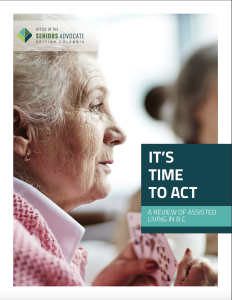It’s Time to Act: A Review of Assisted Living in B.C.

Following a comprehensive review of the province’s assisted living services, the BC Seniors Advocate is calling on government to address the current confusing legislative landscape to protect seniors from significant rent and service fee increases, improve oversight and reporting, and address affordability challenges.
Highlights
- There is significant confusion in the public, within the industry and amongst regulators on what is assisted living covered by the Community Care and Assisted Living Act and what is independent living or supportive living and covered by the Residential Tenancy Act.
- The rate of assisted living units per 1,000 population (75+) has decreased 15% in the last five years.
- Despite a 52% funding increase for publicly subsidized assisted living over the past five years, there has been no increase in either the number of units available or service levels.
- The proportional waitlist for publicly subsidized assisted living is 50% higher than that of long-term care even though assisted living costs the health care system half as much as long-term care and is a fraction of the cost of acute care.
- The current cost of a publicly subsidized assisted living unit at 70% of a senior’s annual income is proving increasingly difficult for low-income seniors given the additional costs residents pay.
- There is no recognized protection related to cost increases in private pay assisted living. Seniors have reported annual increases of up to 15% leaving some unable to afford the charges for the additional support services that they need to live safely.
- Currently there are no regulatory requirements for staffing levels or staff qualifications, and no requirement for annual inspections in assisted living in B.C.
Recommendations
- Significantly increase capacity of publicly subsidized assisted living program with more units and expanded services.
- Reduce confusion seniors and family members experience while navigating assisted living and other congregate living arrangements.
- Provide explicit tenancy protection under the Residential Tenancy Act for all residents in congregate living including assisted living.
- Address affordability issues in both publicly subsidized and private pay assisted living.
- Strengthen current monitoring and enforcement systems to provide quality assurance, resident safety and value for investment in publicly subsidized assisted living.
For more information
Read the news release
Read the full report
View the live stream presentation
View the PowerPoint presentation
